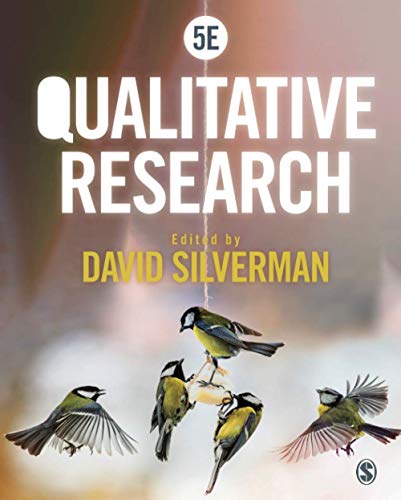Course detail
Instructor
About this course
Course syllabus
Course format
Recommended Background
Recommended Texts
Participant feedback
Venues
Venue and Timetable
A master-class offering early career researchers guidance on how to use the latest constructionist approaches which treat our data as instances of complex behaviours and hence complementary to quantitative research.
This course is being offered 'live' over Zoom.
As Prof. David Silverman is based in the UK, his course will be offered across 4 evenings from October 4, 2021.
Please check the course details and syllabus below.
This course is now full.
David is offering another online course from November 15-18.
Please follow this link for details.

Qualitative researchers too often try to do the same as quantitative research but with smaller samples.
This interactive master-class offers early career researchers guidance on how to use the latest constructionist approaches which treat our data as instances of complex behaviours and hence complementary to quantitative research.
This course is being offered online (via zoom) across 4 evening sessions from 7pm to 9.30pm, Australian Eastern Daylight Time (UTC +11)
(ie Melbourne, Sydney, Canberra daylight savings time)
Prof David Silverman is an outstanding scholar specialising in qualitative research. David is Professor Emeritus in the Sociology Department at Goldsmiths College and Visiting Professor in the Management Department at King's College, University of London and the Business School, University of Technology, Sydney. He has authored 15 books and 45 journal articles on qualitative research, ethnography and conversation analysis. He is the author of four bestselling Sage textbooks on qualitative research and has published monographs on his research on a large public sector organization, medical consultations and HIV-test counselling. Prof Silverman has hosted workshops on qualitative research for PhD students in Australia since 2009 as well as in Europe, Sri Lanka, Hong Kong, Malaysia and Tanzania. He successfully supervised 30 PhD students, three of whom are now full Professors.
This master-class offers lectures and data workshops covering the latest approaches to key areas of qualitative research:
• Improving the quality of interview data analysis. Treating respondents’ accounts as skilful versions of reality. Attending to the step by step production of meaning between interviewer and interviewee.
• Finding sequences in your data. The limits of content and thematic analysis. Finding outcomes in data and tracing the sequences in which they are produced.
• Documents and digital data as social constructions. How to avoid treating them as ‘secondary data’ and tracing the narratives they construct.
• Theorising with qualitative data. Avoiding armchair theorising and theory used as ‘window dressing’. How to induce theories from your data.
The workshop is relevant to both early career researchers and more experienced researchers interested in constructionist approaches who want to improve their research skills.
The workshop will consist of 4.5 hours of lectures, 3 data workshops and 15 minute one-to-one supervisions.
All sessions will run between 7pm and 9.30pm AEDT
EVENING 1
7.00 - Introductory lecture
7.45 - Improving the quality of interview data analysis [lecture]
8.45 - 9.30 - Student data sessions with simultaneous 1-1s
EVENING 2
7.00 - Feedback from data sessions
7.30 - Finding sequences in your data [lecture]
8.45 - 9.30 - Student data sessions with simultaneous 1-1s
EVENING 3
7.00 - Feedback from data sessions
7.30 - Analysing documents and digital data [lecture]
8.45 - 9.30 - Student data sessions with simultaneous 1-1s
EVENING 4
7.00 - Feedback from data sessions
7.30 - Theorising with qualitative data [lecture]
8.45 - 9.30 - Open discussion
This workshop will take place 'live' over Zoom.
Participants will be sent a paper to read, as well as further course documents including workshop topics.
Each participant will receive a copy of
Prof David Silverman is an outstanding scholar specialising in qualitative research. David is Professor Emeritus in the Sociology Department at Goldsmiths College and Visiting Professor in the Management Department at King's College, University of London and the Business School, University of Technology, Sydney. He has authored 15 books and 45 journal articles on qualitative research, ethnography and conversation analysis. He is the author of four bestselling Sage textbooks on qualitative research and has published monographs on his research on a large public sector organization, medical consultations and HIV-test counselling. Prof Silverman has hosted workshops on qualitative research for PhD students in Australia since 2009 as well as in Europe, Sri Lanka, Hong Kong, Malaysia and Tanzania. He successfully supervised 30 PhD students, three of whom are now full Professors.
A basic knowledge of qualitative research.
Each participant will receive a copy of
Prof David Silverman is an outstanding scholar specialising in qualitative research. David is Professor Emeritus in the Sociology Department at Goldsmiths College and Visiting Professor in the Management Department at King's College, University of London and the Business School, University of Technology, Sydney. He has authored 15 books and 45 journal articles on qualitative research, ethnography and conversation analysis. He is the author of four bestselling Sage textbooks on qualitative research and has published monographs on his research on a large public sector organization, medical consultations and HIV-test counselling. Prof Silverman has hosted workshops on qualitative research for PhD students in Australia since 2009 as well as in Europe, Sri Lanka, Hong Kong, Malaysia and Tanzania. He successfully supervised 30 PhD students, three of whom are now full Professors.
Any of Silverman’s current Sage textbooks.
Qualitative Research [5th edition] or, for more advanced researchers, his Very Short Book [second edition].
The ability to have conversations with the lecturer was invaluable (April 2021)
Very useful for my current role and my research (April 2021)
It was quite a shock in some ways, given the critique of thematic analysis and conventional theorising, but a shock I needed to have. And am grateful for. Just wish I'd have come across this earlier in my career! Having David present the material, challenge us and go through questions and examples allowed for an unfolding of awareness for me. I did not get that reading the ebook prior to the course, so the course very much deepened what I had been able to discover through reading. It was well worth it and I have been doing a massive amount of reflection on everything I held unchallenged since Friday night. (October 2020)
Delivery of this course is online - via Zoom.
Please ensure you have the following:
- Reliable Internet connection with at least 5Gb per day of data available (i.e. a 5 day course will use about 25Gb of data just on the Zoom application)
- A computer/laptop with the Zoom application installed (free)
- A webcam (built in to most laptops)
- A headset with a microphone (not required but ideal)
- A second monitor/screen if possible
Please also check the course page for specific software requirements (if any).
